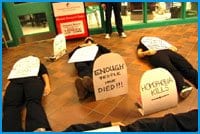Students and faculty at the University of Western Ontario (UWO) are mounting a series of protests against Canadian Blood Services’ (CBS) policy of banning men who have had sex with men from donating blood.
The latest protest took place on Nov 13 when the group Standing Against Queer Discrimination (SAQD) staged a “die-in” outside a CBS blood donor clinic on campus.
That followed SAQD’s demonstration at an information session CBS had held on campus on Nov 9. Protestors wearing black armbands stood and linked arms to protest the CBS policy which bans any man who has had sex with a man even once since 1977 from donating blood.
The information session was organized by the UWO student council which banned all outside media from attending the session. Joshua Ferguson, the codirector of SAQD, says it was an attempt to stifle criticism.
“This was the latest example of a continuing attempt to silence the voices of student advocates arguing for an end to Canada’s outdated policies banning any men who have had sex with men from donating blood,” he wrote in a press release.
During the meeting, students and faculty wearing black arm bands stood and linked arms to express their opposition to the policy.
SAQD was formed about two months ago to fight the CBS policy which has been in place since 1983. Ferguson claims the group has a membership of about 100 students and faculty. The group is trying to persuade UWO to ban CBS from collecting blood on campus, as Montreal’s McGill University did in 2006 to Hema Quebec, that province’s equivalent organization.
“We had planned a protest but not a loud one,” says Ferguson. “We invited the media thinking, ‘Why would it be a problem?’ We never gave the intention to anyone that we were going to do anything that needed police.”
But at the request of a student council member campus police escorted a cameraman from the A-Channel television station out of the room. However Ferguson says a cameraman with SAQD was allowed to film once he showed he was a UWO student.
James Arthurs, the student council’s vice-president for campus issues, says outside media was not allowed because it was an event for UWO students. Arthurs says he also told the CBS representatives that no outside media would be allowed.
“It would be kind of unfair to tell them that and then let media in,” says Arthurs.
But Cindy Graham, CBS’s regional communications manager for Southern Ontario, who attended the event, says CBS did not want any such ban.
“We were open to any and all reporters,” says Graham.
Graham says CBS approached the UWO student council about holding the meeting because they were aware of opposition to their ban on gay men.
“We understand that students are upset. We respect their opinions. Hopefully we can work together to come up with a solution,” says Graham. “The best way to answer everybody’s questions was to come to campus and answer them.”
But Ferguson says the CBS representatives evaded the questions they were being asked.
“They did a lot of ‘Don’t shoot the messenger.’ They always say that Health Canada is the one that has to change the policy,” says Ferguson.
Graham does point to Health Canada, which regulates CBS, as being the ones that have to change the policy. And even some critics of the CBS policy, including Ontario health minister George Smitherman, agree that Health Canada is the real stumbling block.
But Graham says that CBS has responded to concerns by looking at the issue.
“We’re doing research right now,” says Graham. “We are working with [queer lobby group] Egale, with the Canadian Federation of Students, with the Hemophilia Society.”
CBS did meet with queer groups in April of this year but the policy has remained unchanged so far.
Arthurs says the student council is happy to hear CBS is conducting such research.
“As a council we support the fact that CBS is looking into their policy and whether they can do their research and change the policy,” he says.
A university administrator says UWO has no official policy on the issue.
But Ferguson says SAQD intends to keep up the pressure. The organization held a “die in” outside a CBS blood donor clinic on campus on Nov 13, with protestors carrying tombstones.
“Friday night was not the last thing that’s going to happen,” says Ferguson.


 Why you can trust Xtra
Why you can trust Xtra


